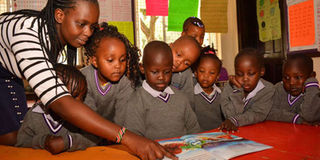What the proposed curriculum leaves out

Ongoing English lesson at Victonell Academy in Nakuru County on August 29, 2017. The proposed system seeks to address the shortcomings of the current 8-4-4 system. PHOTO | AYUB MUIYURO | NATION MEDIA GROUP
What you need to know:
- For sustained economic growth and transformation, financial education is necessary.
- The rate of access to credit in a nation is dependent on the level of financial literacy, which is missing in the new curriculum.
The new curriculum through 2-6-6-3 education system promises to provide a more pragmatic, knowledge and skill-based syllabus that has a bias for identifying and nurturing the talents and passions of the learners.
The proposed system seeks to address the shortcomings of the current 8-4-4 system, which is more examination centred.
It also aims at aligning the education sector to the ever-changing needs of the learners, the needs of the society and those of the global environment.
While the new curriculum is a welcome initiative, it has failed to address certain fundamental issues.
For sustained economic growth and transformation, financial education is necessary.
INNOVATION
The curriculum has not wholly deviated from the traditional mantra that has been drummed in our minds through generations by teachers, parents and the society stereotype of “going to school to get a degree so you can get a high-paying job”.
The education system has not evolved to the extent of teaching about money, and its value.
It has also failed to teach and challenge students to be entrepreneurs rather than jobseekers.
No wonder the level of joblessness among graduates churned out of our education system is confounding.
BANKS
Rather than education being a blessing it has become a curse. It has blocked our spirit of innovation as a nation.
The rate of access to credit in a nation is dependent on the level of financial literacy, which is missing in the new curriculum.
Indeed, many Kenyans, including the educated ones, enter into credit without a clear understanding of the fiscal implications of such agreements.
Banks have for far too long exploited Kenyans. This is clearly exemplified by the many entrepreneurs whose businesses and dreams have been shattered by the mastery of banks in exploiting their financial illiteracy.
Lending should be made more forthright for consumers to avoid adverse effects.
CRITICAL THINKING
To transform the economy there is a need to introduce financial education from kindergarten through to post-secondary education.
It is the only sure way to teach about money, budgets, savings and investment, while inculcating and igniting passions for innovation and wealth creation in the population.
The other missing link in the new curriculum is design thinking, which has taken root in the developed countries.
The concept fosters and promotes innovation by presenting remedies to real-life problems that affect the people and nations.
The concept provokes critical thinking among students by way of brainstorming and intuitive adventure.
This triggers the students to come up with innovative ideas and solutions to the challenges affecting humanity and nature.
ECONOMY
The 2-6-6-3 system should have a review mechanism informed by 21st century global needs underscored by research.
It must be market driven to avoid churning graduates with non-market skills to reduce youth unemployment.
Countries such as Denmark, Germany, the Netherlands, Sweden and USA have the highest financial literacy level according to (S&P FinLit Survery 2014).
Their state of economy is testament enough of the impact of financial literacy.
In recognition of the pivotal role financial literacy plays in an economy, US President George Bush in 2008 established the Presidential Advisory Council on Financial Literacy.
The council advises the president on ways of expanding and improving financial education.
President Uhuru Kenyatta should consider setting up a similar council and have financial education in our new curriculum.
Mr Ndiani, the clerk to the County Assembly of Nyandarua, is an advocate of the High Court of Kenya. [email protected]




